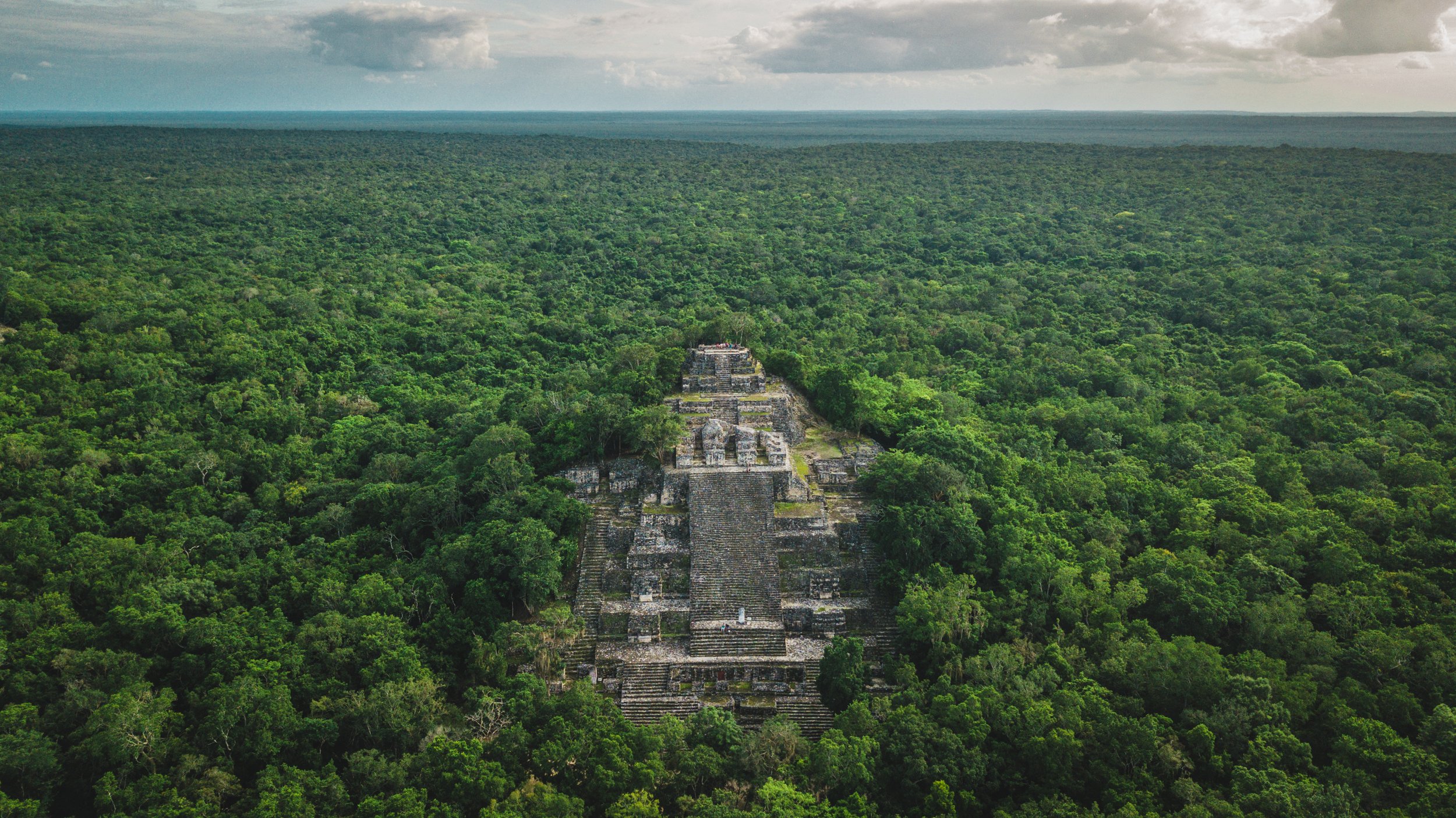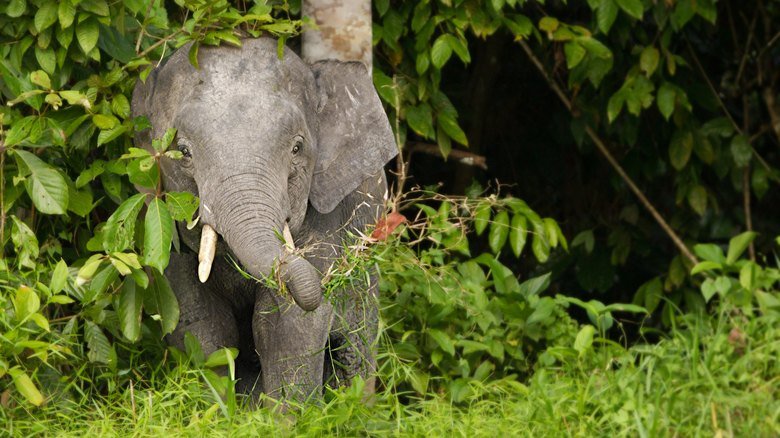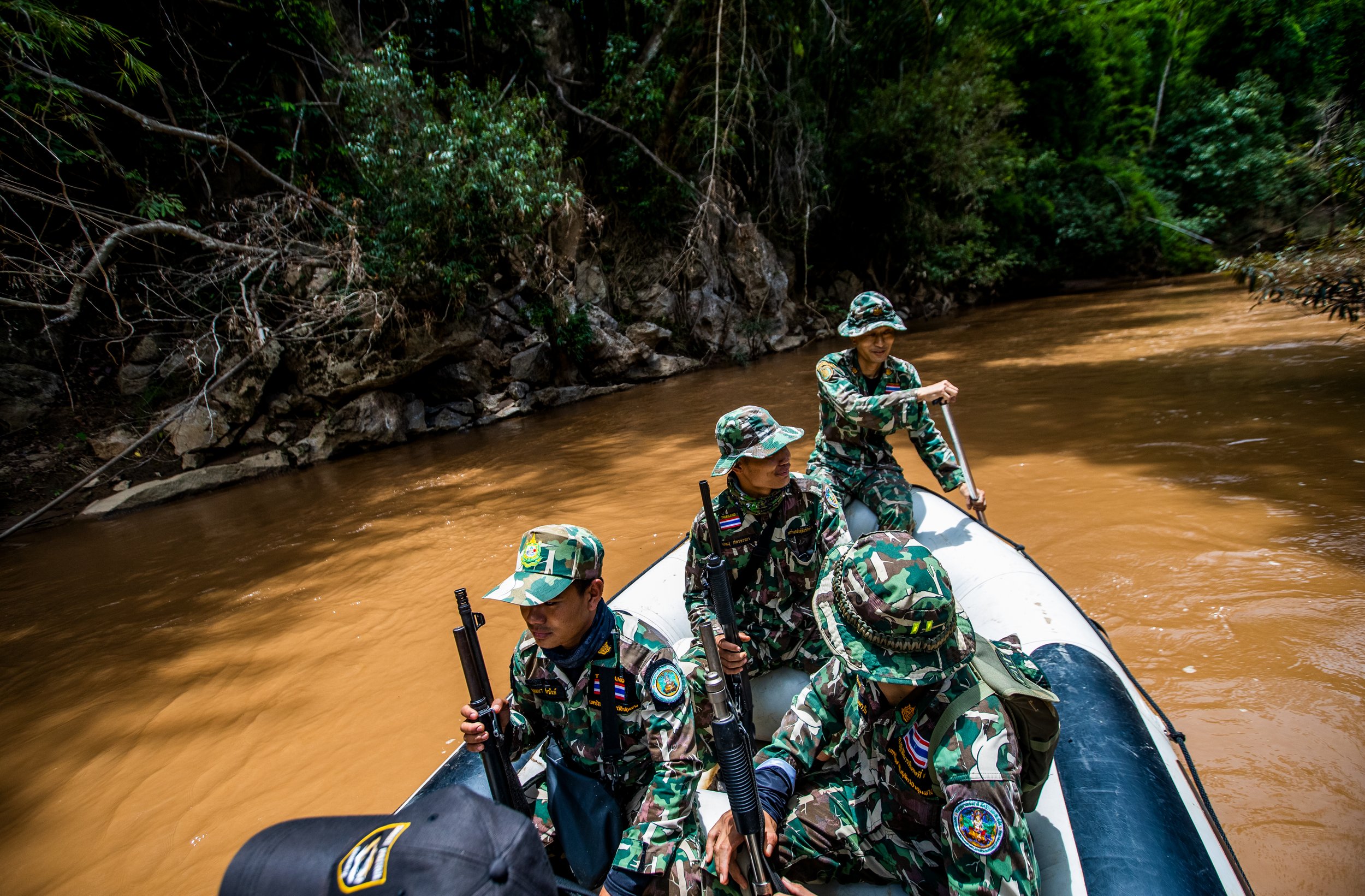
Building technology-driven defense strategies to support communities and nature.
Each project deploys advanced monitoring and ranger training methods to ensure “No Cut, No Kill” protection.
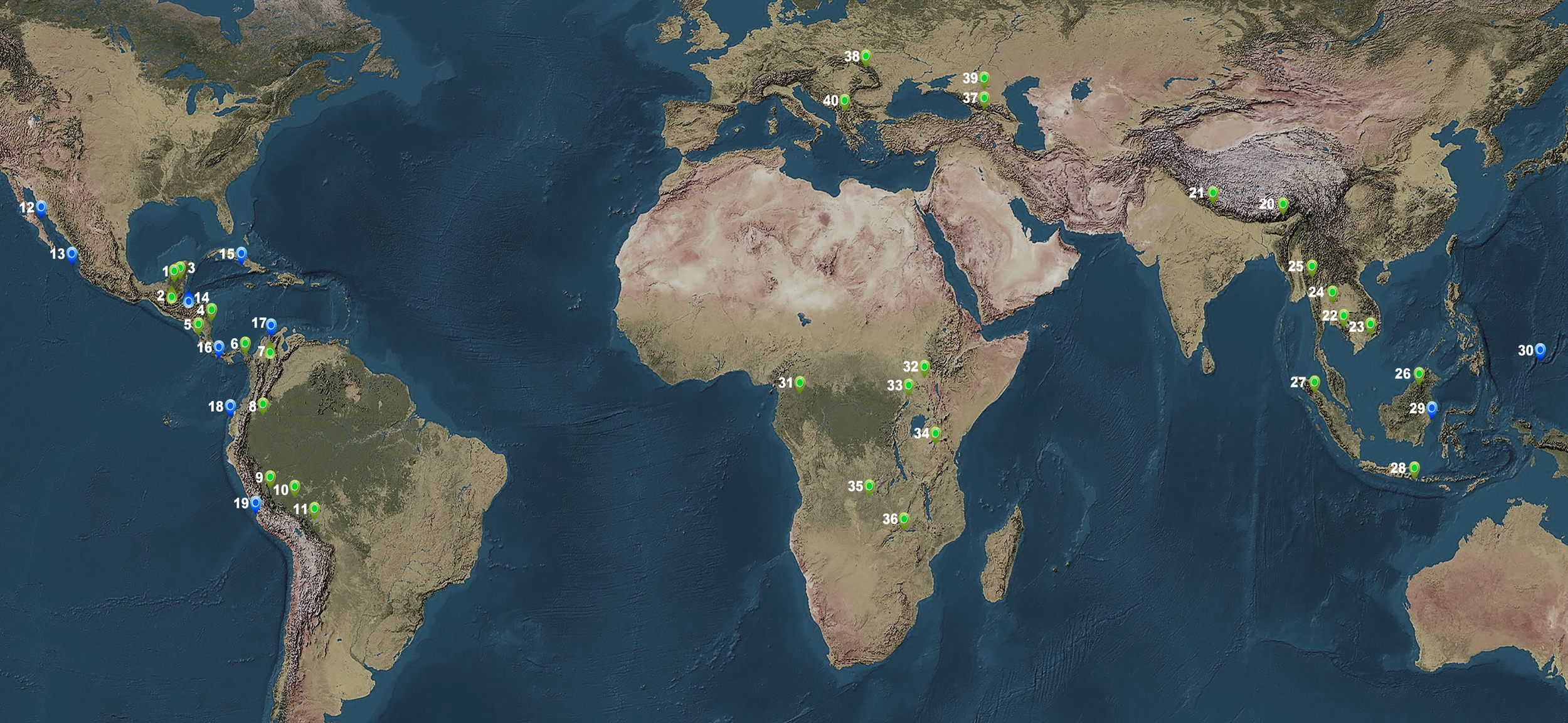
AMERICAS
1. Calakmul Biosphere Reserve, Mexico
2. Mirador National Park, Guatemala
3. Greater Belize Maya Forest, Belize
4. La Amistad World Heritage, Costa Rica & Panama
5. Corcovado National Park, Costa Rica
6. Darien National Park, Panama
7. Sierra Nevada de Santa Marta National Park, Colombia
8. Yasuni National Park, Ecuador
9. Sierra Del Divisor National Park, Peru
ASIA
20. Bardiya-Banke National Parks, Nepal
21. Mouling National Park, India
22. Cardamoms National Park, Cambodia
23. Cat Tien National Park, Vietnam
24. Thap Lan National Park, Thailand
25. Thung Yai-Huai Kha Khaeng World Heritage, Thailand
26. DaMal Rainforest Complex, Sabah Borneo, Malaysia
27. Leuser Ecosystem, Sumatra, Indonesia
28. Komodo National Park, Indonesia
AFRICA
31. Dja World Heritage, Cameroon
32. Kidepo Valley National Park, Uganda
33. Mana Pools World Heritage, Zimbabwe
EURASIA
37. Borjomi National Park, Republic of Georgia
38. Carpathians National Park, Ukraine
39. Racha National Park, Republic of Georgia
40. Shar Mountains National Park, Macedonia
MARINE PROTECTION
12. Baja Sur National Marine Park, Mexico
13. Islas Marias National Marine Park, Mexico
14. Turneffe Atoll Marine Reserve, Belize
15. Jardines de la Reina National Marine Park, Cuba
16. Coiba National Marine Park, Panama
17. Tayrona National Marine Park, Colombia
18. Machalilla National Marine Park, Ecuador
19. Paracas National Marine Park, Peru
High above the Caribbean coast of Colombia, where the land rises dramatically from the sea to nearly 5,700 meters, lies the Sierra Nevada de Santa Marta, a mountain range unparalleled in its ecological richness. This is the highest coastal range in the world, a sanctuary where glaciers gleam atop jagged peaks. This mountain range is more than just a hotspot for biodiversity; it is a spiritual heartland, a place the Kogui people call the "Heart of the World."
In the depths of the Yucatán Peninsula lies Calakmul Biosphere Reserve, a place where the wild heart of the Selva Maya pulses with life and history. This expansive park shelters ancient Maya ruins hidden beneath towering trees, and within its borders, jaguars roam freely, a rare glimpse into a world where nature and culture are inextricably linked.
As part of the Maya Biosphere Reserve, Calakmul is not just a sanctuary for biodiversity but a living narrative of resilience and balance. Here, conservation efforts meet the challenge of preserving one of Central America’s most vital ecosystems while supporting the communities that call this region home.
This is the Heart of the Maya Biosphere and a UNESCO World Heritage site. Mirador National Park, a proposed 500,000-hectare protected area, contains the largest intact primary forest and wildlife habitat in Central America with over 40 major ancient Maya cities and interconnected causeways.
The Amazon is one of the world’s greatest natural treasures: a vast expanse of rainforest stretching across 5.5 million sq. km, teeming with unparalleled biodiversity. One in every ten living species known to man lives here, including 40,000 plant species, 3000 fishes, 1300 birds, and more than 400 mammals.
Panama’s Darién National Park is the largest protected area in Central America and the Caribbean. This Biosphere Reserve is considered the Americas’ most important “natural lung” after the Amazon. Darién is among the most species-rich ecosystems in Central America.
The Greater Belize Maya Forest is critical for the conservation of the Selva Maya, one of the world's largest remaining forests and a haven for jaguars and other threatened species.
La Amistad International Park is a transboundary protected area and World Heritage Site that is shared between Costa Rica and Panama. PILA protects a mosaic of diverse habitats and an extraordinary number of endemic species, found nowhere else on Earth.
Global Conservation has deployed Global Park Defense in Yasuni National Park, Ecuador, one of the Amazon’s bastions for biodiversity. Yasuni, a UNESCO World Heritage Site, is one of the last continuous tracts of virgin tropical forest in eastern Ecuador.
In the heart of Nepal’s Terai, where golden grasslands meet shadowed forests, lie the wild sanctuaries of Bardiya and Banke National Parks. Here, the roar of the royal Bengal tiger echoes through the trees, and the mighty one-horned rhino treads ancient paths. These parks, spanning over 1,500 square kilometers, are lifelines for endangered species and vital corridors in the Western Terai Complex.
With its sprawling forests and meandering rivers, Cat Tien National Park, Vietnam is a natural wonderland that beckons both adventurers and conservationists alike. Among its inhabitants are iconic species facing the threat of extinction. The Asian elephant, a symbol of strength and wisdom, roams these ancient forests, its presence a testament to the rich biodiversity of this region. However, this fragile paradise faces unprecedented threats from human activities and environmental degradation.
There's just one place left on earth where tigers, elephants, orangutans, and rhinos live together in the wild: the Leuser Ecosystem World Heritage Site on the Indonesian island of Sumatra.
Thap Lan is Thailand’s second largest park and one of the last intact habitats for a suite of threatened and endangered species, including tigers, elephants, clouded leopards, Malayan sun bears and hornbills.
In the uneasy peace that followed the Cambodian Civil War, the Cardamom Mountains suffered rampant logging, poaching, and slash-and-burn agriculture as people struggled to find their way in this post-conflict era.
In the Heart of Borneo, there's a place whose uncharted rainforests are so secluded that it has never been permanently inhabited by humans. It’s as though it exists on a separate planet; some call it Sabah’s “Lost World”.
In the northwestern most stretches of the country of Georgia lies a sparsely populated region called Racha-Lechkhumi. There, Georgia has recently created a new national park, part of a broader initiative to expand Georgia's protected natural areas by 100,000 hectares. This protected area aims to safeguard local biodiversity, promote tourism, and create new jobs in the region.
These mountains are one of the world’s biodiversity hotspots: the richest and most threatened reservoirs of life on Earth. This park helps protect many of Georgia’s endemic plants, and a number of imperiled animal species. In the park’s core wilderness area, virgin forests host many of the park’s bear, lynx, wolf, red deer and chamois.
Carpathian National Nature Park is Ukraine’s first and largest national park, and the largest protected area in the Carpathian region. The Carpathian Mountains harbor Europe's largest remaining tracts of primeval forest, and support the continent's largest montane populations of wolves, lynxes, and brown bears.
Shar Mountains is a stunning example of high elevation mountains and forests in the heart of the Balkans. It's a European biodiversity hotspot and an area with outstanding natural values in the border area of North Macedonia and Kosovo.
The Ngorongoro Conservation Area (8,292 km2) in northern Tanzania represents one of the world’s greatest and most important reservoirs of large mammal biodiversity, and also contains one of the most important paleoanthropological sites in the world.
Murchison Falls National Park is best known for the most powerful waterfall in the world, which roars with such intensity that the ground trembles around it. But with over 70 mammal and 450 bird species, it is also a critical area for African biodiversity.
The 220,000-hectare Mana Pools National Park, a UNESCO World Heritage Site, lies in the Lower Zambezi Valley of Zimbabwe, part of a vast unfenced wilderness of over a million hectares where wildlife roams free.
In the southern reaches of the Central African country of Cameroon, near the borders with Gabon and the Republic of the Congo, lies a primeval rainforest called Dja. Here, Global Conservation is entering into our first GC Projects in Central Africa, where we will deploy Global Park Defense to address critical threats.
An oasis in the semi-desert, Kidepo Valley National Park covers 1,442 square kilometers of the spectacular Narus Valley. Dramatic mountains and rocky outcrops surround beautiful expanses of savanna and forest.
Stretching over 160 kilometers along the coast of East Kalimantan Province, the Derawan Archipelago is among the most biologically rich and intact marine ecosystems in all of Indonesia. Maratua Island, one of Global Conservation’s focus areas, not only faces illegal fishing but also annual plastic islands washing onto its shores from the Philippines, Malaysia, and as far away as China.
Although 60% of the world's coral reefs are seriously endangered, there are still bright spots for ocean conservation - areas where reefs are thriving. Conserving these intact reefs is becoming more important than ever. One such place is Jardines de la Reina National Park, in Cuba.
Palau's coral reefs are considered one of the seven Underwater Wonders of the World. They contain a menagerie of megafauna, from giant clams and manta rays to sea turtles, dugongs and fierce saltwater crocodiles that swim among hundreds of coral and sponge species.
In the 1980s in Cabo Pulmo, Baja California Sur, Mexico, fish stocks were forced into a precipitous decline. When Cabo Pulmo National Park was declared in 1995, 35% was preserved as a no-fishing area. After determined action by local families, the entire park was designated a no-fishing zone.
Turneffe is the largest atoll in the Mesoamerican Reef and the largest marine reserve in Belize. This Marine Protected Area, or MPA, is facing serious threats as the ten-year old TASA implements Global Conservation's Global Park Defense.

Today, World Heritage Sites and national parks are becoming our last bastions of defense against the decimation of wildlife and ecosystems. Global Conservation is the only conservation organization whose mission is the direct funding of park protection systems in developing countries.
OUR PROJECTS
We are highly selective in choosing the projects that we support. In order for us to implement Global Park Defense, the site must meet the following criteria:
Be an endangered national park or UNESCO World Heritage Site in a developing country
Contain critical habitat for megafauna with intact, primary ecosystems
Have a highly motivated and well-staffed park authority, possibly with collaboration from proven local NGOs
Have a park authority willing to commit to the Global Park Defense goal of “No Cut, No Kill”, and be willing to fund park border demarcation and communications towers
Show excellent potential for sustainable tourism to support permanent protection
Species Facing Extinction
Global Conservation’s mission is to protect endangered UNESCO World Heritage Sites and national parks in developing countries. By protecting the entire ecosystem, we protect all species. We are not single species-focused, but support protection and science for selected critically endangered keystone species in our projects. We fund scientific studies, including baseline population studies and threat assessments, to protect these Species Facing Extinction. Click on the species below to learn more!
There are three known species of orangutan, and GC project sites have two of them. These highly intelligent apes are among our closest relatives, sharing 97% of our DNA. Unfortunately, they are highly endangered and may be the first great apes to go extinct in modern times.
African wild dogs, also known as painted dogs or painted wolves, are the largest canids in Africa and the second largest in the world after wolves. Historically destroyed as "problem animals" because of conflicts with livestock, their populations have long been declining and they are now considered Endangered. There are only around 1,400 mature wild dogs left in the wild.
Fewer than 3,500 Komodo dragons remain. They once lived across a huge range, spanning Indonesia’s islands and Australia, but since the 1970s, Komodo National Park has been the only place in the world where they can be found. Often weighing more than 300 pounds, these giant lizards can grow up to 10 feet long, run as fast as 12 miles (19 km) per hour, smell blood from almost 6 miles away, and deliver a powerful bite with venom strong enough to kill a human.
The giant anteater is one of the most unique mammals in the world. They are the most endangered mammal in Central America, and fewer than 5,000 are thought to remain across their range.
So few of these mysterious animals remain that scientists have been unable to estimate their population. Sunda pangolins are one of the world's most trafficked mammals. Over a million pangolins worldwide are estimated to have been poached from the wild since 2000, and they are predicted to decline by an additional 80% within the next two decades if they are not protected. GC is working across five national parks and World Heritage Sites in Asia to help save this critically endangered species.
There are two species of clouded leopard in the world, and GC sites have both of them! Just a few thousand individuals of both clouded leopard species remain across their ever-shrinking range in Asia.
Fewer than 450 harpy eagles are likely to remain in Panama. Harpy eagles are enormous birds of prey, tied for the title of world's largest eagle. They are found in rainforest habitats throughout much of South and Central America, and are threatened primarily by deforestation.
Only 1,200 jaguars remain in Mirador National Park, Guatemala, one of the species' strongholds. The jaguar is the largest feline in the Americas, a valuable component of the ecosystem as a top predator and an iconic symbol of South American culture.
Fewer than 100 European mink survive in Ukraine. One of the most endangered mammals in Europe, the European mink's range has been reduced by over 85% since the mid-19th century. The remaining population is small, fragmented, and declining, but Ukraine's Carpathian National Nature Park contains up to 20 breeding pairs.
Just 400 lions survive in Uganda. African lions are the largest and most imposing carnivore in Africa and the only true social cats, and they have special cultural significance in most countries on the continent. Unfortunately, African lion numbers have plummeted by over 40% in the last three generations due to loss of habitat and conflict with people. Three-quarters of African lion populations are in decline.
African savanna elephants are the largest terrestrial mammal on Earth. Though they once roamed throughout sub-Saharan Africa, their range has become increasingly small due to poaching and habitat loss. After rampant demand for their tusks, just 20 super tuskers remain.
Due to decades of heavy poaching, just 400 African forest elephants remain in Cameroon. Like their savannah and Asian cousins, African forest elephants can live for up to 65 years and are considered "gardeners of the forest." Compared to savanna elephants, the forest elephant is in much more serious danger of becoming extinct.
As few as 30 Sumatran rhinos survive in the wild, making them one of the rarest, most endangered mammals in the world. We're working to help protect the largest surviving population in the Leuser Ecosystem of Indonesia.
Around 1,500 Borneo pygmy elephants remain. The Borneo pygmy elephant is the smallest subspecies of Asian elephant, endemic to the island of Borneo. They are one of the least-studied elephants in the world.
Only 220 Indochinese tigers remain in the wild, with most of them in Thailand. The Indochinese tiger is a critically endangered population of tiger native to Southeast Asia, though it now only occurs in Thailand and Myanmar.
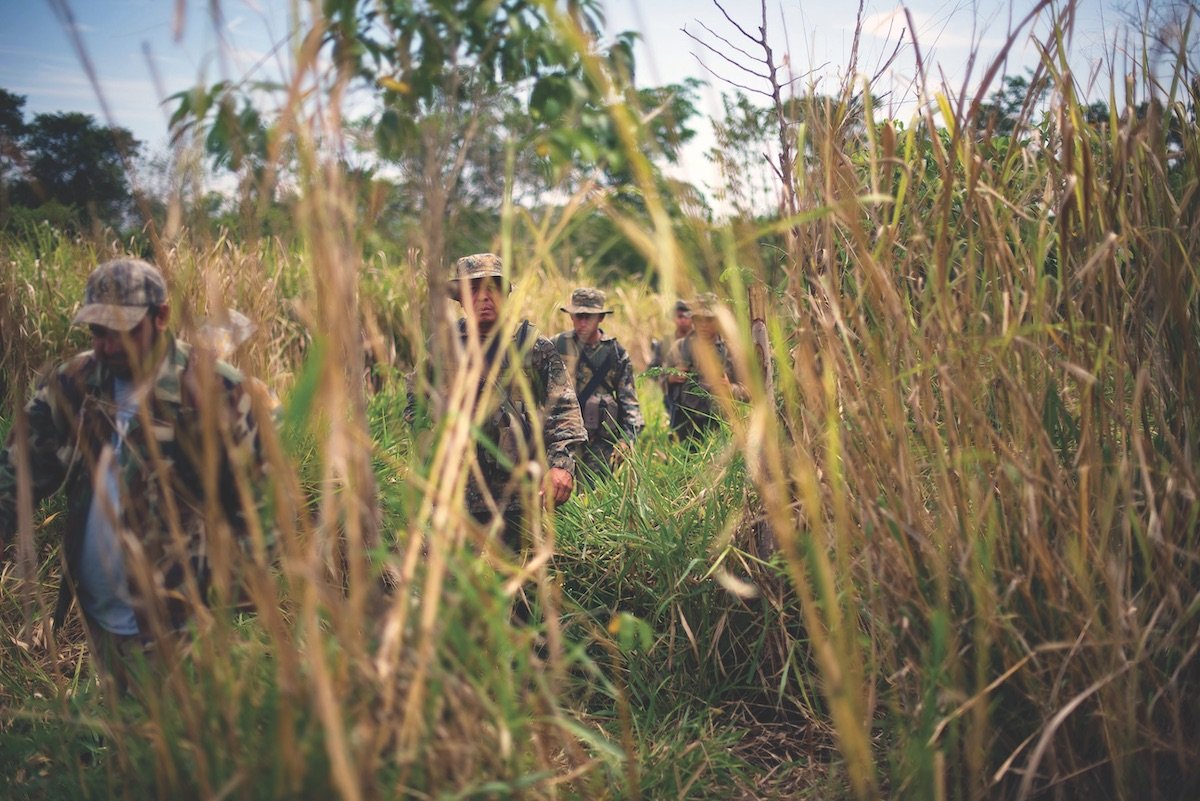
Donate Now to Support Wildlife Defense Globally!
Your donation directly funds innovative park defense programs that empower local communities to protect their wildlife.

Make An Impact,
Join Our Community
Together, we can protect the world’s remaining wild spaces through community-led park defense systems. Your gift directly supports rangers and local communities working to save their wildlife.


